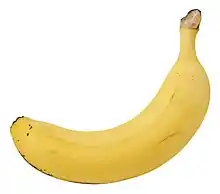Latundan banana
The Latundan banana (also called Tundan, silk banana, Pisang raja sereh, Manzana banana, or apple banana) is a triploid hybrid banana cultivar of the AAB "Pome" group from the Philippines. It is one of the most common banana cultivars in Southeast Asia and the Philippines, along with Lacatan and Saba bananas.[1] Its Malaysian name is pisang rastali.[2]
| Musa 'Silk' | |
|---|---|
 Apple bananas | |
| Hybrid parentage | Musa acuminata × Musa balbisiana |
| Cultivar group | AAB Group (Pome Group) |
| Cultivar | 'Silk' |
| Origin | The Philippines |
Description

Latundan banana plants typically reach a height of 10 to 13 feet. They require full or partial sun exposure. The flowers are yellow, purple, or ivory in color. The fruits are round-tipped with thin yellow skin that splits once fully ripe. They are smaller than the Lacatan cultivar and the commercially dominant Cavendish bananas.[3][4] They have a slightly acidic, apple-like flavor.[5]
Taxonomy
In older classifications, the Latundan cultivar was once the plant referred to as Musa sapientum. It has since been discovered that Musa sapientum is actually a hybrid cultivar of the wild seeded bananas Musa balbisiana and Musa acuminata and not a species.[6]
The Latundan banana is a triploid (AAB) hybrid.[7]
Its full name is Musa acuminata × M. balbisiana (AAB Group) 'Silk'.
Uses
Culinary
Latundan bananas are popular dessert bananas that are eaten raw or cooked without the skin. The shoots and stalks are eaten cooked. In Myanmar and Thailand, the flowers are cooked and eaten in some recipes.
Home Decor
They are also cultivated as ornamental plants.
Diseases
References
- Hautea, D.M., G.C. Molina, C.H. Balatero, N.B. Coronado, E.B. Perez, M.T.H. Alvarez, A.O. Canama, R.H. Akuba, R.B. Quilloy, R.B. Frankie, C.S. Caspillo (19 July 2002). "Analysis of induced mutants of Philippine bananas with molecular markers". Institute of Plant Breeding, College of Agriculture, University of the Philippines Los Baños, FAO Corporate Document Repository. Retrieved 12 January 2011.
{{cite web}}: CS1 maint: multiple names: authors list (link) - "Go Bananas with These 12 Varieties Worth Seeking Out in the Philippines". 5 April 2021.
- "Lacatan, Latundan & Senorita bananas". marketmanila.com. 8 March 2007. Retrieved 13 January 2011.
- "BANANA". Philippine Department of Agriculture. 8 March 2007. Archived from the original on 26 June 2003. Retrieved 13 January 2011.
- "Musa 'Silk', AAB Group". learn2grow.com. Archived from the original on 8 March 2012. Retrieved 11 January 2011.
- "Musa sapientum". users.globalnet.co.uk. Retrieved 11 January 2011.
- Michel H. Porcher; Prof. Snow Barlow (19 July 2002). "Sorting Musa names". The University of Melbourne. Retrieved 11 January 2011.
